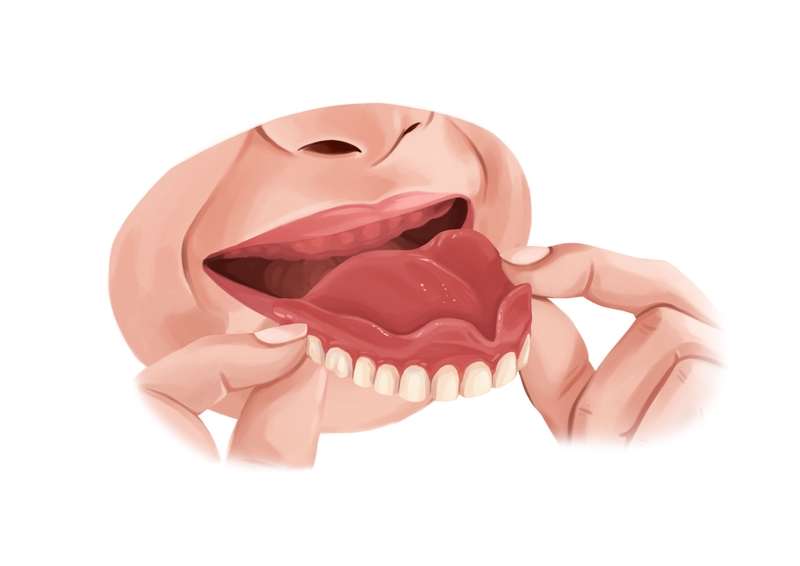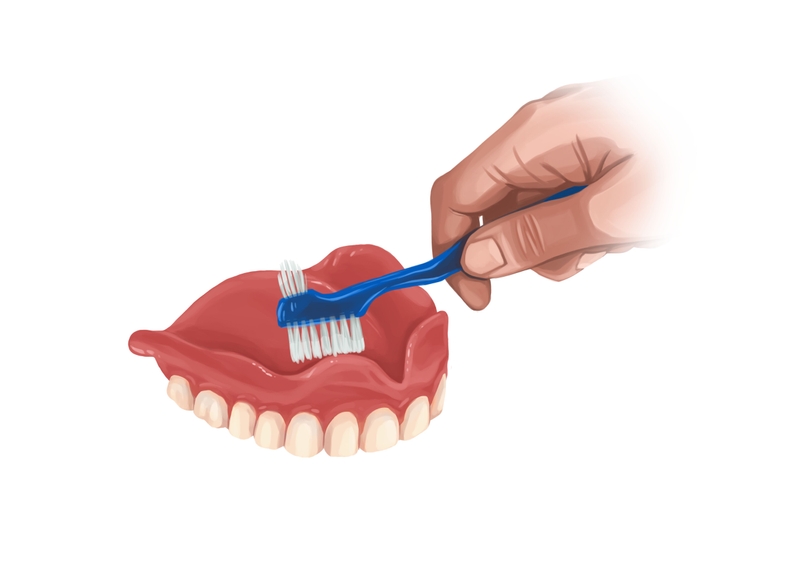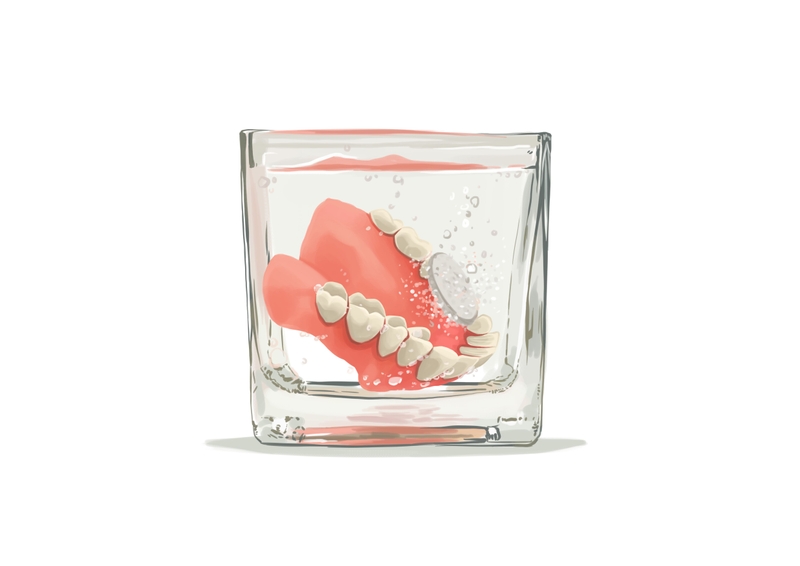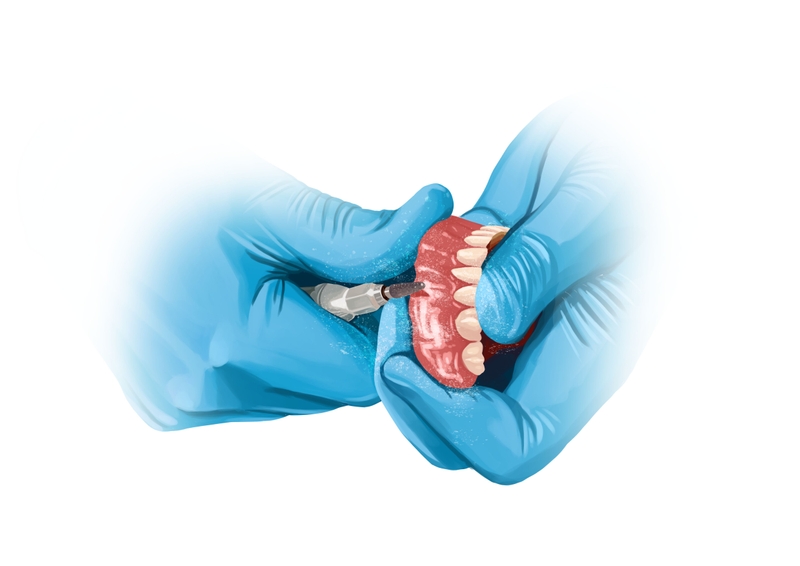- You should handle your dentures gently to avoid their damage. Clean them daily to prevent infection and discoloration.
- Refrain from using toothpaste, exfoliating toothbrushes and mouthwash, as they are too aggressive for dentures.
- Leave all adjustments, relining and repairs to a professional. Otherwise, you risk irreversibly damaging your dentures.
Use Authority Dental to book an appointment for the one day dentures in your town, or sign up for a dental discount plan and save up to 60% on all dental procedures, including dentures.
Not sure what cleaning products to use for your dentures or how often to wash them? Here's everything you need to know.
Learn to handle your denture safely

Picture by Authority Dental under CC 2.0 license
Putting your denture in and taking it out properly is very important. Pulling or tugging on it can lead to damage. Your dentist will provide detailed instructions on the best way to do this. Below is a quick guide.
Start with your top arch. Press your thumb lightly against the inner side of the front teeth.
Push up and out towards the nose, until you feel it coming loose.
If the suction is significant on the upper denture, gently pop down one of the back corners.
To remove the lower arch, grab it gently with two or four fingers.
Rock back and forth until the grip is released.
Clean your denture on a regular basis

Picture by Authority Dental under CC 2.0 license
The ADA recommends that you clean your denture at least once a day. Ideally, do this after every meal. It not only kills the unpleasant odor and helps avoid stains but also eliminates bacteria.
If you don’t clean your denture properly it will become a habitat for germs. This can lead to serious infections in the mouth that can be hard to fight off. It may also prevent you from being able to wear your denture for a while.
Brushes with stiff bristles, exfoliating toothpaste, and mouthwash are all prohibited. The same goes for electric toothbrushes. They are too harsh for delicate dentures. The best method of cleaning dentures is using a denture brush or a soft-bristled one along with denture cleaner, hand soap, or dish soap.
Never use products that are not intended for dentures. Stay away from sharp objects. Toothpicks and dental scrapers are unsuitable and could cause damage to your prosthesis. Any products containing bleach are also a definite no-no. The best way to keep your dentures looking good is cleaning them properly. There is no way to whiten dentures if they become stained.
Store your denture correctly

Picture by Authority Dental under CC 2.0 license
Keep your denture in water when it is not in your mouth. In the case your denture does not have metal clasps, you can prepare a half-water half-vinegar mixture. You can also get an overnight solution. This often comes in the form of tablets that you dissolve in warm water.
If your denture dries out it can change shape or become very brittle. A break of 6-8 hours every night is recommended. This helps your soft tissues recover from all-day wear and prevent infections.
Many patients store dentures overnight on the sink. If you live alone or with adults only, this is okay. Otherwise, come up with a high shelf or another place where it will be inaccessible to children and pets. It is best to have a glass or container dedicated to just storing your denture.
Leave adjustments and repairs to the professionals

Picture by Authority Dental under CC 2.0 license
Investing in a denture means running costs. Those include relining, repairs, and adjustments. Professionals spend years perfecting the craft. Doing by yourself at home could do more harm than good.
Relines should be done every year or so. They are necessary, as your mouth changes shape over time. When teeth are missing, bone becomes reabsorbed by the body. The denture has to be lined with material to make up for the loss.
Adjustments are often necessary at the beginning, to make sure the fit is as good as can be. If the situation in your mouth changes, you may need to visit a prosthodontist to add a tooth, make adjustments, or have a new denture fitted.
Replace your dentures every 5-10 years

Picture by Authority Dental under CC 2.0 license
How long your denture lasts depends on the following:
how well you take care of it, and
the quality of your oral hygiene.
Materials like metal and porcelain tend to last longer than acrylic. Maintaining proper hygiene of both the prosthesis and your mouth can extend its lifetime. Nonetheless, dentures should be replaced every 5-10 years.
Don't forget to take care of your mouth

Picture by Authority Dental under CC 2.0 license
Even full dentures are not an excuse not to take care of your mouth and gums. In fact, wearing dentures often comes with pieces of food getting stuck in hard-to-reach areas. It is vital to keep up with brushing and sometimes even flossing.
Whenever you take your denture out, rinse your mouth. Use a very soft brush to massage your gums. If they are tender, use a washcloth or clean fingers. Wipe your tongue, cheeks, and the roof of your mouth as well. Brush and floss any remaining teeth and finish off with mouthwash.
If you wear a partial denture, use a separate brush for your mouth and the prosthesis.
Keep up with regular dental visits

Picture by Authority Dental under CC 2.0 license
Everyone is advised to visit the dentist at least once a year. During a regular checkup, the dentist will inspect your mouth as well as your prosthesis. The condition and fit will be professionally inspected. Your dentist will remove plaque from dentures and suggest the best cleaners.
Neglecting check-ups may lead to lesions, lumps, soreness, irritation, or even oral cancer. A regular visit is also a good time to let your dentist know whether you are thinking of any cosmetic changes to your prosthesis.
What’s more, if you have any natural teeth remaining, you should have a professional cleaning at least once a year.
Following these steps will help you reduce the risk of dental emergencies.
FAQ
FAQ
How long can dentures stay out of water?
The gum-colored acrylic in your denture needs moisture to retain its shape and good condition. If you let it dry out it will become less pliable and more prone to cracks and fracture.
Don’t leave them out of reach of any moisture for more than 2 hours. Soaking them when you sleep is key.
Richard Hattaway, DDS
Do not use toothpaste on dentures. It is designed for teeth and often too abrasive on the plastic the dentures are made of. The toothpaste will cause micro-abrasions that will make them more prone to bacteria growth.